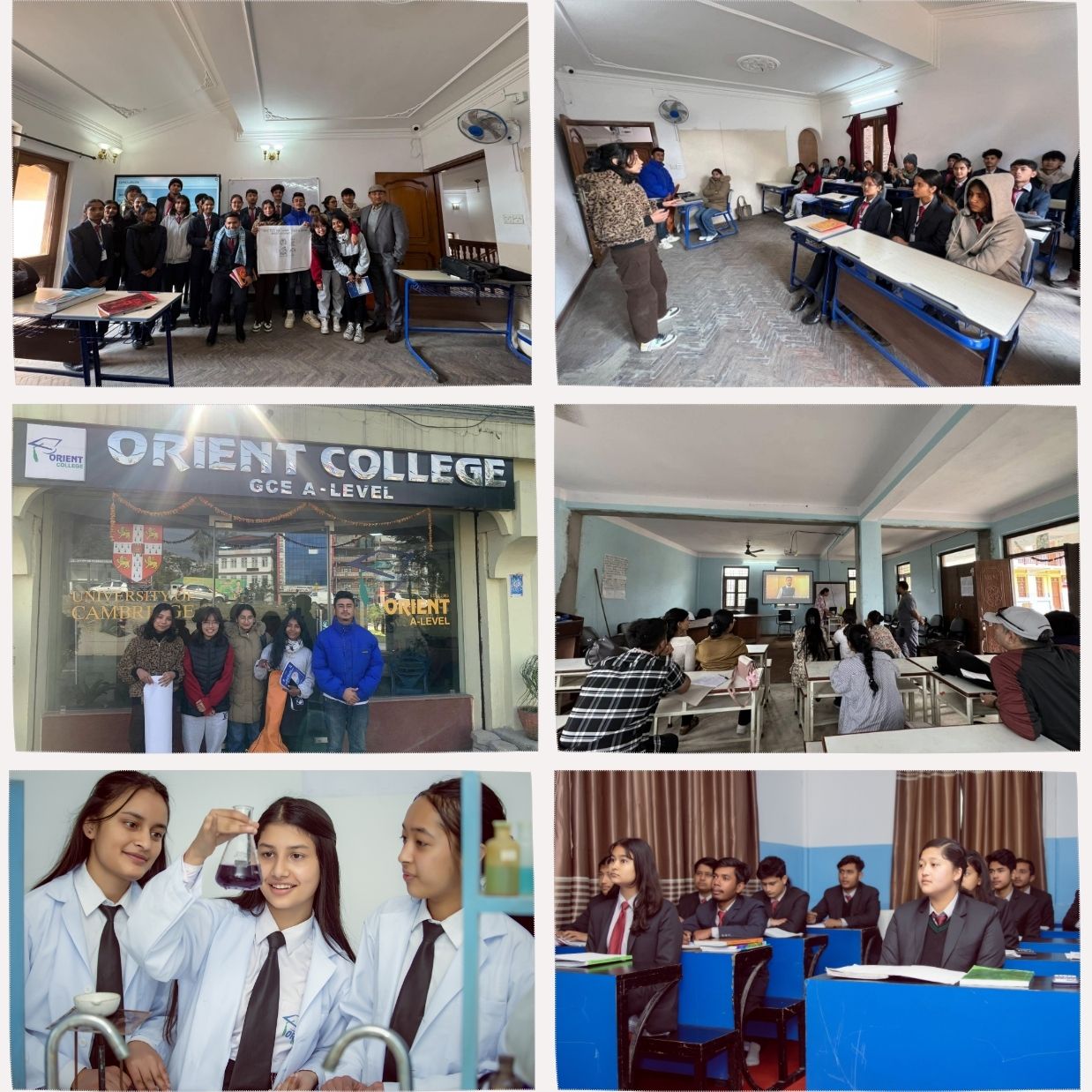Overview
Orient College is an academic institution in Basundhara, Kathmandu, offering higher secondary (+2) programs under the National Examination Board (NEB), undergraduate degrees affiliated to Tribhuvan University (BBS, BASW, BPsych), and Cambridge AS & A Level.
The college has separate blocks for different streams, a library, laboratories, and spaces for seminars and student activities. The college states a mission of developing knowledge, skills, and moral responsibility through an educational approach that values character and community service. Its stated motto is “Education for Excellence.”
Quick Highlights
-
Established: 2003
-
Location: Basundhara, Kathmandu
-
Affiliations / Boards: NEB (+2); Tribhuvan University (BBS, BASW, BPsych); Cambridge (AS/A Level)
-
Programs: +2 Science, +2 Management, +2 Humanities; BBS; BASW; BPsych; AS/A Level Science and Non-Science streams
-
Facilities: Library, science and computer labs (with internet), MIS, cafeteria, CCTV-equipped classrooms, basketball court, seminar spaces
-
Learning Culture: Student presentations, project work, participatory learning, formative/diagnostic evaluation, seminars and short trainings
-
Scholarships: Merit-linked seats with defined bands for AS/A Level (with additional categories such as district/school toppers and ECA performers)
Academic Programs Offered
NEB Ten Plus Two (+2)
Streams: Science, Management, Humanities. The college notes optional subjects that reflect current interests, such as Hotel Management, Travel & Tourism, Mass Communication, and Computer Science. Instruction combines classroom teaching, lab/practical exposure (for Science and Computer), and student presentations.
NEB +2 Science (Grade 11–12)
-
Core areas typically include Physics, Chemistry, Biology or Computer Science, and Mathematics, along with English and Nepali, following NEB structures.
-
The college mentions practical labs and subject-wise individual and group presentations.
NEB +2 Management (Grade 11–12)
-
Compulsory subjects include English, Nepali, and Social Studies & Life Skills Education.
-
Optional combinations may include Accountancy, Economics, Business Studies, Hotel Management, Computer Science, Travel & Tourism.
NEB +2 Humanities
-
Offered as one of the available streams; electives can draw from the college’s listed optional subjects.
Note: Final subject mapping, seat availability, and internal combinations are set by the college in line with NEB regulations for the relevant academic session.
Tribhuvan University (Undergraduate)
Bachelor of Business Studies (BBS)
-
Four-year TU program focusing on accounting, finance, economics, and management studies for entry-level careers in business and administration.
Bachelor of Arts in Social Work (BASW)
-
Four-year TU program oriented to community services, social development, and casework settings, combining theory with field exposure.
Bachelor in Psychology (BPsych)
-
TU-affiliated bachelor’s level Psychology program referenced in the course list. Students typically study foundational psychological theories, methods, and applied areas.
Cambridge GCE AS & A Level
Science and Non-Science
-
The college runs AS/A Level in a dedicated block. Indicative subjects include General Paper, Mathematics, Physics, Chemistry, Biology, Computer Science (Science set) and Accounting, Economics, Business, Mathematics, Art & Design, Sociology, Computer Science (Non-Science set). Subject entries and sessional availability are decided by the college per Cambridge guidelines.
Admission Process
The precise dates, forms, and cut-offs vary by program and year. Applicants should always verify current notices issued by the college and the relevant board/university.
General outline (by level):
-
NEB (+2):
-
Eligibility is based on SEE or equivalent results per NEB criteria.
-
Applicants typically submit academic transcripts, recent photos, and ID copies as instructed.
-
Program/subject allocation may consider entrance screening, counseling, or merit criteria as practiced by the institution.
-
-
Tribhuvan University (BBS, BASW, BPsych):
-
Eligibility is based on completion of higher secondary level or equivalent as per TU norms.
-
The college handles application intake and program selection consistent with TU regulations.
-
-
Cambridge AS/A Level:
-
Admission typically considers prior academic record and counseling for subject combinations aligned to Cambridge course pathways.
-
Students should confirm subject availability and exam session plans in the current year’s brochure/notice.
-
Documents usually requested:
-
Academic mark sheets/transcripts and character certificate (relevant level), recent photographs, a valid ID copy, and any board-specific forms. Program-specific instructions are published by the college each intake.
Teaching Faculty and Learning Methodology
The college notes experienced faculty, participatory classroom culture, project work, student presentations, and periodic seminars. It highlights formative and diagnostic evaluations to give learners regular feedback. Short trainings and guest interactions are used to connect academic content with field practices.
Key features of the approach:
-
Classroom engagement through individual/group presentations and project tasks.
-
Subject-specific practicals (Science/Computer) in on-site labs.
-
Seminar cycles and periodic training for interested learners.
-
Emphasis on regular feedback and supportive mentoring.
Infrastructure and Learning Facilities
-
Academic blocks: Separate blocks for major program groups.
-
Library: Collection of textbooks, reference works, journals, magazines, and newspapers.
-
Laboratories: Science and computer labs with internet access for experiments and coursework.
-
MIS: A management information system to handle academic and administrative records.
-
Classrooms: CCTV-equipped rooms and basic modern amenities for routine teaching.
-
Cafeteria: Space for meals and breaks.
-
Sports: Basketball court within the campus.
-
Seminars/Training areas: Venues for short courses and interactions.

Student Life and College Experience
Students work in small groups for presentations, complete projects aligned to course outcomes, and participate in seminars that expose them to current ideas in their fields. The presence of activity zones (library, labs, court, cafeteria) supports daily routines and peer interaction. The college’s stated goal is to encourage academic seriousness with personal values and social responsibility.
Extracurricular Activities (ECA)
The college highlights structured ECA under the guidance of instructors and invited experts. These include sports opportunities (with the basketball court), seminar participation, and themed activities connected to programs such as Travel & Tourism, Mass Communication, and Hospitality when offered as optional subjects. ECA is framed as part of a balanced campus routine.

Scholarships and Financial Support
Merit-linked scholarship bands (AS/A Level):
-
≥ 90%: Full admission and monthly fee scholarship (limited seats)
-
87.5%–89.99%: 75% in admission and monthly fees (limited seats)
-
85%–87.49%: 50% admission + 50% monthly fees (limited seats)
-
80%–84.99%: 50% admission + 25% monthly fees (limited seats)
-
75%–79.99%: 50% admission (limited seats)
-
70%–74.99%: 25% admission
Additional categories mentioned include district/school toppers, students with disabilities, ECA achievers, conflict-affected groups, and children of martyrs. Continuation of scholarship depends on maintaining academic standards as per college rules. Specific quotas are defined in the college’s scholarship notice for the intake year.
Achievements and Institutional Milestones
The college notes subject toppers in Nepal for A Level subjects in earlier cohorts. It also references notable outcomes in Business Studies and Chemistry in previous exam cycles. These statements are part of the college’s historical record of exam performance and should be read in context of individual exam sessions and subject entries.
Why Choose Orient College?
Presented as neutral considerations drawn from the institution’s own information.
-
Clear program ladder: NEB +2 → TU bachelor’s degrees → Cambridge AS/A Level pathway.
-
Active learning: presentations, projects, and evaluations aimed at steady progress.
-
Facilities for daily study: library, internet-enabled labs, seminar spaces, and a cafeteria.
-
Campus safety and oversight: CCTV-equipped classrooms.
-
Merit-linked scholarships with published bands and limited seats.
Conclusion
Orient College positions itself as a multi-stream institution in Kathmandu with school-leaving (+2) programs, bachelor’s degrees under TU, and Cambridge AS/A Level. Its documentation highlights a values-oriented academic culture, structured student work, and infrastructure that supports routine study. Applicants should consult the college’s latest notices for year-specific details on seats, fees, and timetables.
Frequently Asked Questions (FAQ)
1) Which boards and universities does the college work with?
NEB for +2 programs; Tribhuvan University for BBS, BASW, and BPsych; Cambridge for AS/A Level.
2) What subjects are available at +2?
Science, Management, and Humanities. Optional subjects noted by the college include Hotel Management, Travel & Tourism, Mass Communication, and Computer Science, subject to sessional availability.
3) What laboratories are present on campus?
Science and computer labs with internet access; the college also notes a library, MIS, cafeteria, and CCTV-equipped classrooms.
4) Are scholarships available?
Yes. The college lists merit-linked bands (with limited seats) for AS/A Level and special categories such as district/school toppers and ECA performers. Maintenance criteria apply.
5) How does the college support learning beyond lectures?
Participatory classwork, individual/group presentations, project work, periodic seminars, and short trainings are part of the academic routine.
6) Is there a sports facility?
The campus mentions a basketball court and emphasizes ECA under guided supervision.
7) Where can I verify intake-specific information?
Check the college’s current notices or prospectus for the academic year. Policies on seats, fees, and timelines are finalized and announced per session.
Contact Orient College's administrative office for detailed information on the course, admissions, location, fees, scholarships, facilities, counseling, or eligibility. You can also stay updated, share reviews, explore academic courses, ask questions, and join discussions.
Contact Details:
Orient College
Basundhara, Kathmandu, Nepal
Phone: +977-1-4362218, +977-1-4362504, +977-1-4354056
Email: info@orientcollege.com
Website: http://orientcollege.com

















